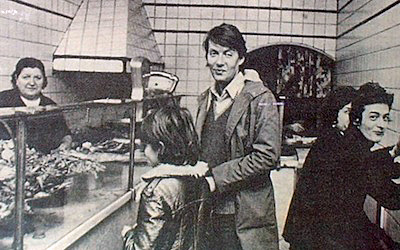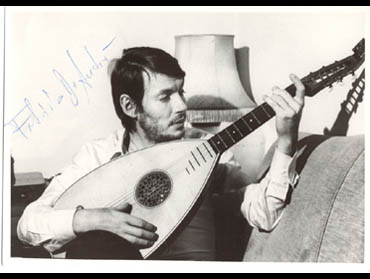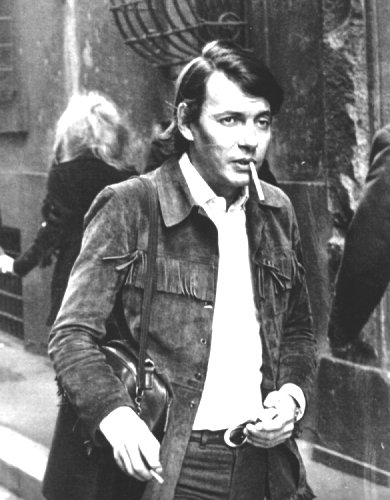I remember the first time I heard his voice. I was sitting in the car with my summer fling somewhere in southern Italy. We had driven to a forest next to the sea, revelling in that euphoric teenage anticipation, and, as we parked among the pine trees, he turned on the radio. The air was instantly caramelised by the music which was fed through the speakers–Fabrizio De André’s “Il Pescatore”, my first taste of his brilliance…
All’ombra dell’ultimo sole
s’era assopito un pescatore
e aveva un solco lungo il viso
come una specie di sorriso.
(In the shadow of the last rays of sun
a fisherman was dozing off,
and he had a groove along his brow
which almost seemed like a smile.)
My summer fling ended up enduring every other season and, in our years together, he introduced me to and educated me on De André’s extensive repertoire. I learned how his lyrics, his instruments, and his rhythms were all a reflection of Italian culture at its best and, often, at its worst.

Fabrizio De André and his son Cristiano in a "friggitoria", a typical place of hystorical centre of Genoa (1960s)
De André’s love, loss, and reflections on romance
De André also pulled experiences from his life and, as his nickname suggests, poeticized them. In 1979, he and his partner Dori Ghezzi, living in Sardinia, were kidnapped by bandits and held hostage for four months. The kidnappers knew of De André’s privileged background and asked for a ransom of 1 billion lire; once paid, De André wrote “Hotel Supramonte”. The title comes from the mountains where he was imprisoned, and he likens his time in real captivity to the feeling of confinement in love. It’s noteworthy that he chose not to condemn his captors through his position of musical power, but rather to use his experience to convey a more universal sentiment. Indeed, when discussing his captivity, De André would say of the bandits “they were the real prisoners, not I.” Instead, he condemned the higher power organization that got the bandits–who were eventually arrested–to do their dirty work for them.
Love was, of course, one of the main themes which De André pondered. His lyrics of love are plagiarized in romantic letters, vowed at altars, printed and stuck to bedroom walls, graffitied onto city streets, and tattooed onto bodies… but not because he had the answers. Rather, he asked the questions. His wisdom lay in his courage to interrogate even the most vulnerable feelings of the heart. In his own life, he went through rounds of love and loss, including a divorce from his first wife, Puny, with whom he had a son. It was then that he met Ghezzi, another singer, and although they never married, they became lifelong partners. Themes from these relationships weave through “La Canzone dell’Amor Perduto” (“The Song of Love Lost”), exploring the breakdown of a relationship through the symbolism of wilting flowers; “Un chimico” (“The chemist”), a story of a chemist who dies without ever loving, in an attempt to avoid any suffering from the pains of heartbreak; and “Amore che viene, amore che vai” (“Love that comes, love that goes”), which harmonizes on love’s volatility.
Quei giorni perduti a rincorrere il vento
A chiederci un bacio e volerne altri cento
Un giorno qualunque li ricorderai
Amore che fuggi da me tornerai
Un giorno qualunque li ricorderai
Amore che fuggi da me tornerai
(Those days long gone of chasing the wind,
of asking each other for a kiss and wanting one hundred more,
one of these days you’ll remember them.
You, love who runs away, you’ll come back to me.
One of these days you’ll remember them.
You, love that flees, you will return to me)
However, De André’s moments of cynicism are countered by ones of great tenderness and maturity. “La Stagione del tuo Amore” is a love song which reassures that time may pass but love will not:
La stagione del tuo amore
non è più la primavera
ma nei giorni del tuo autunno
hai la dolcezza della sera.
Se un mattino fra i capelli
troverai un po’ di neve
nel giardino del tuo amore
verrò a raccogliere il bucaneve.
(The season of your love
is no longer in Spring,
but in the days of your Autumn,
you are as sweet as the evening.
If one morning, among your hair,
you find a line of snow,
in the garden of your love
I will come and pick the snowdrop.)

De André’s music as a collaboration
De André’s eclectic and wide-ranging work is often performed in various dialects, demonstrating his curiosity and desire to resonate not only with the regions which he was affiliated to (namely Genova and Sardinia), but also with the country as a whole, united yet proudly heterogeneous.
“Don Raffae” is sung in thick Neapolitan, “Zichirltaggia” in oozing Sardinian, and perhaps one of his most important works, “Crêuza de mä”, in whimsical Genovese. Translated as “Muletrack by the Sea”, this folkloric work recounts the stories of nomadic fishermen with one foot in the sea and the other on land. Growing up in a large fishing town, De André would have watched sailors coming and going across the shores with purpose but without direction. “Crêuza de mä” aims to capture the lifestyle of the lost as they return to land and eat home comforts such as frittûa de pigneu, giancu de Purtufin, and çervelle de bae ‘nt’u meximu vin (fried fish, Portofino white wine, and lamb’s brains cooked in the same wine).
And then, their work pulls them back to the waves:
E ‘nt’a barca du vin ghe naveghiemu ‘nsc’i scheuggi…
bacan d’a corda marsa d’aegua e de sä
(And we will sail through the cliffs in that wine boat…
master to the rotten rope of water and salt)
During the outro, the music begins to wind down, and the voices of fishermen, street vendors, and Genovese laborers reach a crescendo. As a stickler for authenticity, De André ensured that this track was recorded live from a fish market in his hometown. He wanted his listeners to be transported to the world which had so influenced him in his life and work and to make clear that his music is a collaboration. While his storytelling abilities give his music a mystical and often fantastical quality, more often than not, De André sings about real–the most real–people.
“La Canzone di Marinella”, for example, which shot de André to fame, may seem to recall a fairytale about a girl with whom a prince falls in love; the girl, Marinella, dies at the end of the song, leaving the prince in heartbroken agony. In reality, Marinella was a girl named Maria Boccuzzi who, at 16 years old, was orphaned and turned to prostitution to make a living; murdered by a client, her body was thrown into the river. De André was so deeply moved when he read her story in a paper at age 15 that he tried to reinvent her life and sweeten her death. He turns tragedy into beauty. This is De André’s power.
Toeing the line: De André’s legacy
While a household name in Italy, often considered the country’s answer to Bob Dylan, De André never gained worldwide notoriety. Perhaps it’s because his lyrics are arguably more important than his melody, and one must understand them with all their symbolism and storytelling in order to unravel their true beauty. I believe, however, that his music is beautiful in its own right and that you don’t always need to know the words to feel the meaning. Notwithstanding his often-contentious views, which he never hid in his lyrics, it’s difficult to find anyone in Italy who doesn’t enjoy or at least respect De André’s work. Toeing the line between reality and fantasy, hearty and heart-wrenching, critical and commemorative, the duality of De André and his musical poetry is best summed up by, unsurprisingly, no one other than himself:
Persa per molto persa per poco
presa sul serio presa per gioco
non c’è stato molto da dire o da pensare
la fortuna sorrideva come uno stagno a primavera spettinata da tutti i venti della sera.
(Lost for a long time, lost for a little,
taken seriously, taken lightly,
there wasn’t a lot to say or to think.
Fortune smiled like a pond in springtime, tousled by all the evening winds.)
– Se Ti Tagliassero a Pezzetti
